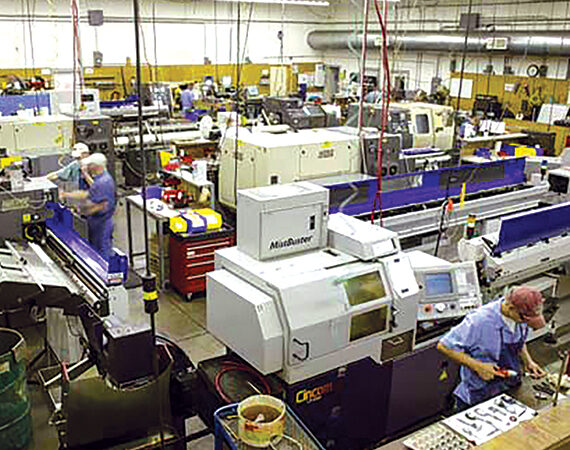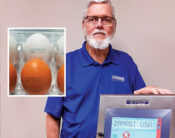In 1981, an industrious post-World War II Yugoslavian immigrant named Josef Goerges launched a manufacturing company from his garage in Pequot Lakes. Pequot Tool & Manufacturing (PTM) quickly outgrew its small space and relocated to nearby Jenkins. Now in 2020, PTM is a third-generation family business of 95,000 square feet and 180 staff.
And amid a global pandemic, the company is prospering. The medical industry and others have utilized Pequot Tool’s CNC machining, turning, punching, and forming. But the company’s secret weapon is Training Within Industry (TWI)—a manufacturing strategy that dates back to World War II, when U.S. manufacturers scrambled to fill vacancies left by soldiers called to war. Circumstances then, as now, forced every domestic industry to adapt to survive.
Enterprise Minnesota has for years offered modernized TWI training. Its four-way approach famously combines:
- Job Instruction (JI – training leaders to be teachers)
- Job Methods (JM – identifying and implementing more efficient processes)
- Job Relations (JR – fostering healthy, respectful relationships between leadership and staff)
- Job Safety (JS – keeping the workplace safe for all)
As a long-time TWI advocate, Pequot Tool represents living proof of the reliability of this war-tested, decades-old system.
Production Planning
Paul Millard is PTM’s assistant manager of production planning. After 15 years with the company, he’s overseen the business from the manufacturing floor to scheduling and logistics and can’t remember a time before TWI.
When the coronavirus pandemic began shuttering businesses in Minnesota, Pequot Tool remained open. Perhaps no one could have predicted this emergency, but Millard and PTM were ready for an emergency.
“Thanks to the incredible teams we have here, we’ve not only kept people working, but we’ve also been thriving,” Millard says. “We were able to get ahead of the issues we knew we’d face and become flexible with our staff and workload.”
In a time of crisis, the training in job relations in particular has made the difference, he says. Like other TWI companies, Pequot Tool learned to be flexible with scheduling or work-from-home opportunities. Company managers took the time to understand the needs of team members as well as the company’s goals. Millard says this people-first approach has kept morale high while plotting a path through the unforeseen.
A New ‘Normal’
Normal may never be the same, but for Pequot Tool & Manufacturing, the pandemic has proved an opportunity to challenge old conceptions and find new solutions. The future is as uncertain now as it was in March, but Millard’s optimism displays the value of having a plan before disaster strikes.
“‘Normal’ will all be relative,” he says. “We all know there is a chance things will never go back to how they were. I think we’ll learn from this in terms of how much we can get done while still allowing individuals to work flexible schedules, especially those in our office environments. The ability to work remotely and maintain productivity opens up opportunities we hadn’t realized before. TWI—specifically Job Relations—plays heavily into that. Ensure good one-on-one working relationships between individuals and leadership will do nothing but benefit us as we move toward a ‘new normal.’”
In the end, Millard describes the TWI system as a flexible methodology of putting people first while focusing on best practices and safety. It’s a timely message, and it’s being tested under fire today as it was in the 1940s.
“TWI is relevant for all industries, and I’d go one step further and say it’s relevant for everyone—period,” Millard remarks. “I use my Job Relations training in my day-to-day life with friends, family, and even my kids. Using factual information in times of stress is a life skill I wish everyone had. Overall, it’s working on getting out of an employee’s way and letting him or her do his or her best work in an environment where both the company and the individual can thrive.”
…
Featured story in the Summer 2020 issue of Enterprise Minnesota magazine.


